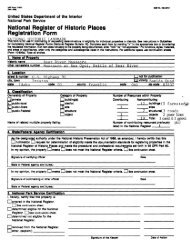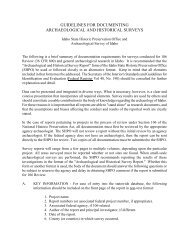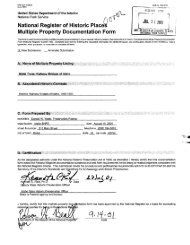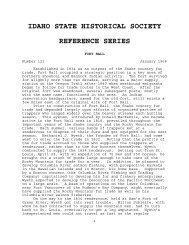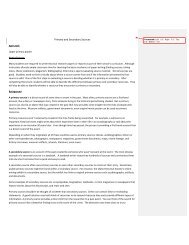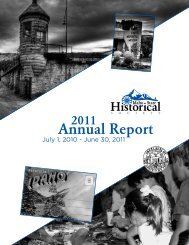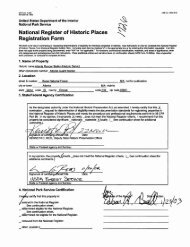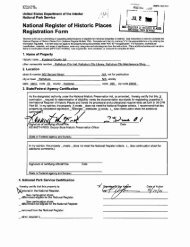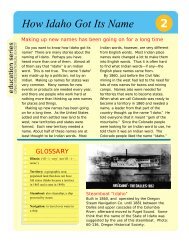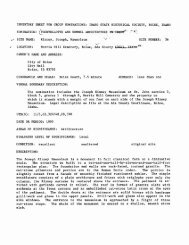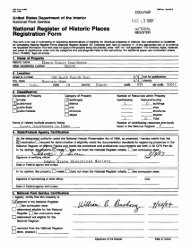Inmates of the Idaho Penitentiary 1864-1947 - Idaho State Historical ...
Inmates of the Idaho Penitentiary 1864-1947 - Idaho State Historical ...
Inmates of the Idaho Penitentiary 1864-1947 - Idaho State Historical ...
- No tags were found...
Create successful ePaper yourself
Turn your PDF publications into a flip-book with our unique Google optimized e-Paper software.
INMATES OF THE IDAHO PENITENTIARY <strong>1864</strong>-<strong>1947</strong>Petitioners for <strong>the</strong> release <strong>of</strong> John Starr (no. 3357)reportedly included <strong>the</strong> “Biggest business man inEmmett,” an “Old timer,” <strong>the</strong> “Secretary <strong>of</strong> <strong>the</strong> LastChance Ditch Company,” <strong>the</strong> “First white child bornin Boise and early settler in Payette Valley,” and <strong>the</strong>“Editor <strong>of</strong> <strong>the</strong> Emmett Index, who says that he neverheret<strong>of</strong>ore signed a petition for pardon, though hehas many times been asked to do so.”On his intake form, Spanish immigrant Paul Arruti (no. 3589) listedhis nearest relative as <strong>the</strong> Merino Pool Hall in Boise. The prosecutingattorney noted that Arruti’s “associates seem to be <strong>of</strong> good averagecharacter, except as Arruti became Americanized he was occasionallythrown in contact with <strong>the</strong> jazz class.”19241925Anthony Zepina (no. 3358) entrusted his watch fob to <strong>the</strong>warden for safekeeping, along with instructions that he shouldbe buried with it were he to “die here.” Zepina asked that hiswatch and money be sent to an orphan in “Jugo Slavia” and hisclothing and shoes given to “some american poor man.” Zepinawas paroled a few months later without his watch fob havingbeen returned to him.Thomas O’Hara’s (no. 3039) letter to warden William Cuddy—addressed as “Old Chap”— from a Chicago jail, protested tha<strong>the</strong> was unable to obtain employment, <strong>the</strong> Young Men’s ChristianAssociation (YMCA) had taken his card away, “<strong>the</strong> I.W.W. I foughtfor don’t know me now”, and that he was being harassed by <strong>the</strong>“Brutal Cops.” The new warden, Joseph Wheeler, replied thatdespite O’Hara’s “yeoman service... in trying to establish <strong>the</strong> rule<strong>of</strong> <strong>the</strong> proletariat,” O’Hara would not be allowed to return to<strong>Idaho</strong> because “while here you acted very much like an ingrate,finding fault and carping criticism with <strong>the</strong> cuisine service ando<strong>the</strong>r appointments.”The Lewis County sheriff reported that John Ross (no. 4131)“went through <strong>the</strong> walls <strong>of</strong> our jail building on Mon. night” whileawaiting trial. The prosecuting attorney claimed Ross had said he“would give up <strong>the</strong> criminal life only because it does not pay.” Hewas later (1941) killed as a prowler in Tulsa. Ross’ unidentifiedbody was reported to <strong>the</strong> FBI as an “Unknown Dead Man.”Forger John Doucas (no. 3206) violated his paroleand was arrested in Chicago after being soughtby <strong>the</strong> California Bankers Association, AmericanBankers Association, and <strong>the</strong> William J BurnsInternational Detective Agency. Doucas was killedat <strong>the</strong> <strong>State</strong> Prison at Folsom while attempting toescape in 1927.To a letter from Albert Workman’s (no. 3814) wife,warden Wheeler replied: “...tone down your letters...Your husband will be embarrassed and it is naturalthat such letters belittles him and makes it appearto us that he comes from a very tough, immoralenvironment and it lessens his chances. So be fair toyour husband and if you find it impossible to writedecently, just omit writing.”1926192719281929Commodore Perry Sam (no. 3344) wrote letters <strong>of</strong> petition to <strong>the</strong> governor, a prosecuting attorney, a district judge, a Bannockcounty commissioner, and “Chief Satan” aka “that unsuspected Spirit <strong>of</strong> <strong>the</strong> living”, care <strong>of</strong> <strong>the</strong> secretary <strong>of</strong> state.Burel McCall (no. 4211) was convicted <strong>of</strong> possession <strong>of</strong> liquor after crashing his car into a gasoline pump and later on a side road,and entering a stranger’s home in Garden Gulch, near Culdesac, where he “demolished all <strong>of</strong> <strong>the</strong> furniture in <strong>the</strong> house,” broke outall thirteen windows, and set fire to an out building.Lester Thompson’s (no. 4372) second incarceration ended four years with a Pocatellobaseball team, <strong>the</strong> “colored Giants.” According to <strong>the</strong> prosecutor, Thompson’sfa<strong>the</strong>r “was a rodeo rider and was killed in Montana a year or two ago”; his mo<strong>the</strong>rmaintained a reputation as a “fine woman” with a “quite respected” family.Victor Chacon’s (no. 4379) pardon application reflected on 1,000 years <strong>of</strong> Mayo (Yoreme) history in <strong>the</strong> Americas, “where my Peoplenumber about 14,000 Soules, my Fa<strong>the</strong>r is one <strong>the</strong> Chiefs <strong>of</strong> his People, we are an Independent Tribe enjoying full Tribal Rule...”During <strong>the</strong> trial <strong>of</strong> James O’Neil (no. 4448),a witness provided <strong>the</strong> court with a recipeand proportions for making “a little homebrew”— <strong>of</strong> lemon, sugar, water, yeast, andpotatoes— called “Snake River Special”: “Q.What kind <strong>of</strong> drink would that be after you gotit made. A. Real nice drink. Q. Real nice drink,was it. A. Yes, sir. Q. Have you got any SnakeRiver Special on hands at <strong>the</strong> present time. A.I have not, but I wish I had.” Prohibition endedtwo years later, in 1933.After his prison sentence was commuted to timein <strong>the</strong> Bannock county jail, Leo Lucero (no. 4399)attempted an escape with Charley Cornish (no.4403) and Leroy Meyers (no. 4405), with <strong>the</strong> aid <strong>of</strong>Rulon Wilson (no. 4610). The four men used hacksaw blades and a bottle <strong>of</strong> acid to cut a hole in<strong>the</strong> floor and through <strong>the</strong> window bars. All threewere sent to <strong>the</strong> penitentiary for <strong>the</strong> attempt.1930193119321933xix



